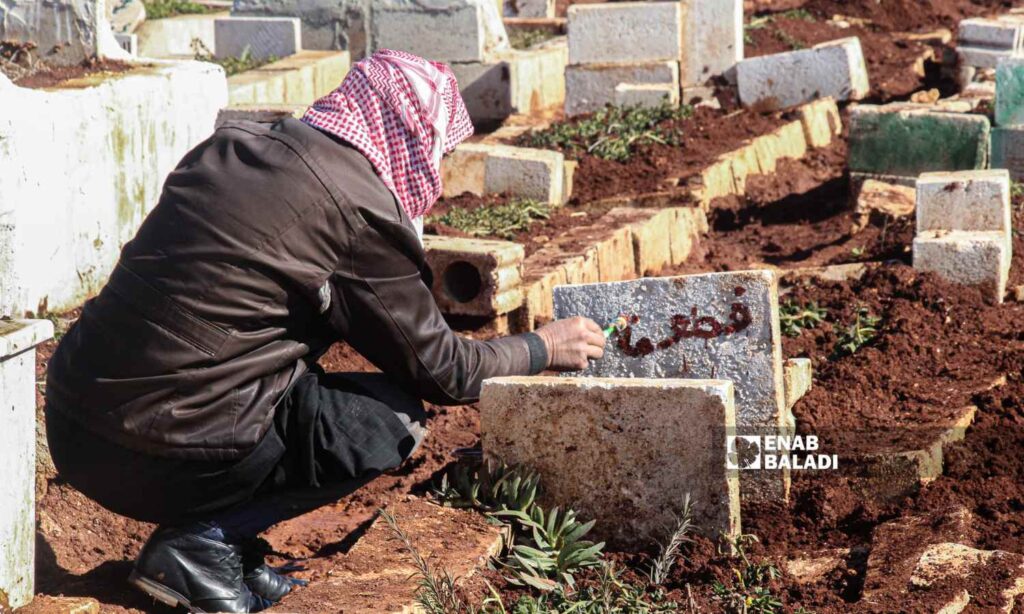Before February 6, 2023, Hamid’s family lived like any displaced family in the cities and towns of northern Syria, sometimes days of joy and happiness, and sometimes days of sorrow and concern, until that day and moment came, changing the family’s life, overturning their living and shattering their hopes.
The earthquake catastrophe created an irreparable break in the heart, mind, and consciousness of Hamid Assaf, making the day of the earthquake a pivotal point in his life. Everything before it was not like after it, according to what he told Enab Baladi, adding that no one would feel the loss of loved ones except those who have tasted the bitterness of its flavor, the harshness of its reality, and its severe days.
Assaf, a displaced from the village of al-Attshana in the southern countryside of Aleppo, lost 16 members of his family due to the earthquake, after the collapse of the building they were staying in, in the village of Basnia, west of Idlib, and he survived along with his brother and two sisters, from the earthquake that hit southern Turkey and four Syrian provinces a year ago.
The earthquake resulted in the death of more than 4,500 people and injured about 10,400 people in northwest Syria, and in areas controlled by the Syrian regime, 1,414 people died in the provinces of Hama, Aleppo, and Latakia, while in Turkey, more than 56,000 people died and about 100,000 others were injured, according to United Nations data.
The final farewell
Assaf began the early hours of the morning of the earthquake searching through the rubble, hoping to find any signs of life in the bodies of the 16 family members beneath the debris and rubble left by the earthquake.
In his talk to Enab Baladi, he mentioned that the process of extracting and retrieving his family members continued for three days, describing them as the harshest, most intense, and calamitous days of his life.
“They were all buried in a mass grave, and it was the final farewell,” Assaf added.
After the burial, a series of memories began on one side and sadness on the other, and the obligations that had to be performed from a third.
Thereafter, Assaf and his siblings began a new, shattered life filled with wounds, grief, and sorrow, a life in which they recall the memories of each member they lost, he said.
Regarding receiving aid, Assaf explained that the humanitarian and relief assistance he received was acceptable, as he received financial amounts in three installments from the GOAL organization, with each installment valued at 150 USD (1 USD equals 30.2 Turkish lira).
He said there are some aid from “good-hearted people” and some charitable associations, but he does not remember their value due to the forgetfulness that befell him after the earthquake.
Assaf and the surviving members of his family are still living in a tent that is not properly equipped, as it needs insulation to protect them from the summer heat and the winter cold.
In recent months, Assaf had worked in watering olive lands in the area of Harem and its surroundings until the end of the olive picking season shortly before the end of 2023, and he is currently looking for a new job opportunity to meet the needs and demands of daily life.
After the earthquake, volunteer teams and locals in northern Syria demanded the introduction of equipment and machinery to speed up the rescue operations for those trapped under the rubble.
Demands were met with UN excuses of logistical obstacles to the delivery of aid for the first four days after the earthquake, which experts and humanitarian activists, in their conversation with Enab Baladi, attributed to the United Nations “letting down the Syrians” and showing clear neglect of their needs during the disaster.
They explained that there were many indicators that the UN deliberately delayed aid delivery, contributing to transforming rescue operations into operations for body retrieval.

